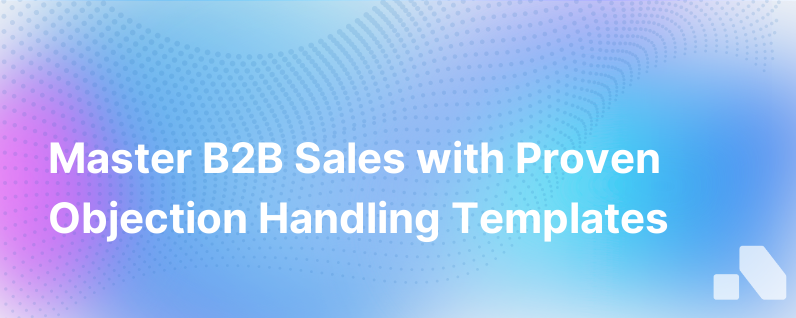Objection Handling Templates For B2B Sales
Published on October 24, 2023 by David Zhang
Objection handling is an art that every salesperson must master to thrive in the intensely competitive B2B landscape. Anyone in sales can attest to the fact that no matter how strong your pitch, product, or rapport with the prospect might be, objections are inevitable. As disheartening as they can seem, objections are often a prospect's way of expressing interest or seeking more information. The key to successful objection handling is preparedness, and that's where templates come into play.
In this comprehensive guide, we'll explore objection handling templates tailored for B2B sales, revealing the secrets to turning apprehensions into affirmations and leads into loyal customers.
Understanding Objections in B2B Sales
First, let’s dig into the psyche behind objections. In B2B sales, an objection is not a flat-out rejection, but a request for further dialogue. Objections typically fall into several categories:
- Pricing: “Your solution is too expensive.”
- Authority: “I have to check with my supervisor before we can proceed.”
- Need: “I’m not convinced we need your product right now.”
- Urgency: “We can look at this next quarter.”
- Trust: “I haven't heard enough customer success stories to be confident in your solution.”
Each category demands its own strategy, and templates can provide a baseline for handling these routinely.
Crafting Objection Handling Templates for B2B Sales
Creating effective objection handling templates requires anticipating common barriers and prepping robust responses. A well-crafted template should include:
- Acknowledgement: Validate the prospect's concerns without agreeing with them.
- Clarification: Probe deeper to understand the root of the objection.
- Response: Address the objection succinctly with facts, stories, and ROI evidences.
- Confirmation: Check if the objection has been overcome and the prospect is ready to move forward.
Below are templates addressing the most common B2B sales objections, ready for adaptation to your specific situation.
Pricing Objections
Acknowledgement: "Understanding the cost touchpoints within the decision-making process is key; let's dive into the specifics of our product's ROI."
Clarification: "Is budget the main constraint, or are you concerned about the value the product will bring relative to the cost?"
Response: "Our product is priced to deliver maximum ROI in the shortest time possible. Let's compare the cost against the benefits and potential savings over time."
Confirmation: "Can we work on a custom ROI forecast to illustrate the long-term financial impact for your company?"
Authority Objections
Acknowledgement: "It's important to make sure that every stakeholder feels comfortable moving forward."
Clarification: "Would you like to arrange a joint call or presentation to address any higher-level concerns directly?"
Response: "We often work directly with senior decision-makers and can provide additional materials or case studies to ease concerns."
Confirmation: "Would it help if we scheduled a demo with all relevant parties to align on the next steps?"
Need Objections
Acknowledgement: "It's crucial that our solution aligns with your current business needs and objectives."
Clarification: "Could you share more about the priorities for your team and where our solution seems to not fit?"
Response: "Our product has been designed to solve X problem which aligns with the goals you mentioned earlier. May I illustrate how several clients have benefitted from it?"
Confirmation: "Do you agree that the problem we solve is something that could drive value for your organization, perhaps even in ways not initially considered?"
Urgency Objections
Acknowledgement: "Timing is important, and it's essential that implementation aligns with your business cycle."
Clarification: "What's driving the timeline for your team, and might there be risks in delaying this decision?"
Response: "Others in your industry have found that starting now can provide a competitive edge and we can phase the rollout to match your internal timelines."
Confirmation: "Is there a milestone event or date that would make sense for us to target as a start point?"
Trust Objections
Acknowledgement: "Hearing directly from those who have faced similar challenges can be very revealing."
Clarification: "Would specific case studies or referrals from our current customers address your concerns?"
Response: "We have an array of success stories and testimonials from businesses similar to yours. Let me share the details and the contact for customer references."
Confirmation: "Would hearing about these experiences directly from a current client help in moving forward?"
Putting Templates into Action
A template is only as good as its execution. When responding to objections, it's crucial to:
- Listen Carefully: Understand precisely what the prospect is concerned about — don't make assumptions.
- Stay Empathetic: Always acknowledge the legitimacy of the client's concerns.
- Be Concise: Deliver your prepared response squarely addressing the issue without veering off-topic.
- Ask for Feedback: Check in to ensure your response has addressed their objection, and they are ready to move forward.
Conclusion
In B2B sales, objections can be the gatekeepers to closing a deal. By using objection handling templates like the ones provided above, sales professionals can navigate these challenges with greater confidence and efficacy. Remember, the goal of objection handling is not to overcome but to understand and align with the prospect's concerns, transforming doubts into opportunities for deeper engagement and, ultimately, successful sales.